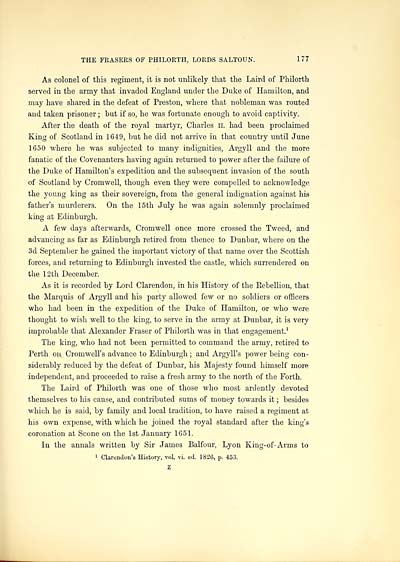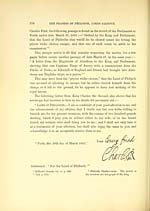Frasers of Philorth > Volume 1
(217)
Download files
Complete book:
Individual page:
Thumbnail gallery: Grid view | List view

THE FRASERS OF PHILORTH, LORDS SALTOUN. 177
As colonel of this regiment, it is not unlikely that the Laird of Philorth
served in the army that invaded England under the Duke of Hamilton, and
may have shared in the defeat of Preston, where that nobleman was routed
and taken prisoner ; but if so, he was fortunate enough to avoid captivity.
After the death of the royal martyr, Charles u. had been proclaimed
King of Scotland in 1649, but he did not arrive in that country until June
1650 where he was subjected to many indignities, Argyll and the more
fanatic of the Covenanters having again returned to power after the failure of
the Duke of Hamilton's expedition and the subsequent invasion of the south
of Scotland by Cromwell, though even they were compelled to acknowledge
the young king as their sovereign, from the general indignation against his
father's murderers. On the 15th July he was again solemnly proclaimed
king at Edinburgh.
A few days afterwards, Cromwell once more crossed the Tweed, and
advancing as far as Edinburgh retired from thence to Dunbar, where on the
3d September he gained the important victory of that name over the Scottish
forces, and returning to Edinburgh invested the castle, which surrendered on
the 12th December.
As it is recorded by Lord Clarendon, in his History of the Rebellion, that
the Marquis of Argyll and his party allowed few or no soldiers or officers
who had been in the expedition of the Duke of Hamilton, or who were
thought to wish well to the king, to serve in the army at Dunbar, it is very
improbable that Alexander Eraser of Philorth was in that engagement. 1
The king, who had not been permitted to command the army, retired to
Perth on. Cromwell's advance to Edinburgh ; and Argyll's power being con-
siderably reduced by the defeat of Dunbar, his Majesty found himself more
independent, and proceeded to raise a fresh army to the north of the Forth.
The Laird of Philorth was one of those who most ardently devoted
themselves to his cause, and contributed sums of money towards it ; besides
which he is said, by family and local tradition, to have raised a regiment at
his own expense, with which he joined the royal standard after the king's
coronation at Scone on the 1st January 1651.
In the annals written by Sir James Balfour, Lyon King-of-Arms to
1 Clarendon's History, vol. vi. ed. 1826, p. 453.
Z
As colonel of this regiment, it is not unlikely that the Laird of Philorth
served in the army that invaded England under the Duke of Hamilton, and
may have shared in the defeat of Preston, where that nobleman was routed
and taken prisoner ; but if so, he was fortunate enough to avoid captivity.
After the death of the royal martyr, Charles u. had been proclaimed
King of Scotland in 1649, but he did not arrive in that country until June
1650 where he was subjected to many indignities, Argyll and the more
fanatic of the Covenanters having again returned to power after the failure of
the Duke of Hamilton's expedition and the subsequent invasion of the south
of Scotland by Cromwell, though even they were compelled to acknowledge
the young king as their sovereign, from the general indignation against his
father's murderers. On the 15th July he was again solemnly proclaimed
king at Edinburgh.
A few days afterwards, Cromwell once more crossed the Tweed, and
advancing as far as Edinburgh retired from thence to Dunbar, where on the
3d September he gained the important victory of that name over the Scottish
forces, and returning to Edinburgh invested the castle, which surrendered on
the 12th December.
As it is recorded by Lord Clarendon, in his History of the Rebellion, that
the Marquis of Argyll and his party allowed few or no soldiers or officers
who had been in the expedition of the Duke of Hamilton, or who were
thought to wish well to the king, to serve in the army at Dunbar, it is very
improbable that Alexander Eraser of Philorth was in that engagement. 1
The king, who had not been permitted to command the army, retired to
Perth on. Cromwell's advance to Edinburgh ; and Argyll's power being con-
siderably reduced by the defeat of Dunbar, his Majesty found himself more
independent, and proceeded to raise a fresh army to the north of the Forth.
The Laird of Philorth was one of those who most ardently devoted
themselves to his cause, and contributed sums of money towards it ; besides
which he is said, by family and local tradition, to have raised a regiment at
his own expense, with which he joined the royal standard after the king's
coronation at Scone on the 1st January 1651.
In the annals written by Sir James Balfour, Lyon King-of-Arms to
1 Clarendon's History, vol. vi. ed. 1826, p. 453.
Z
Set display mode to:
![]() Universal Viewer |
Universal Viewer | ![]() Mirador |
Large image | Transcription
Mirador |
Large image | Transcription
Images and transcriptions on this page, including medium image downloads, may be used under the Creative Commons Attribution 4.0 International Licence unless otherwise stated. ![]()
| Histories of Scottish families > Frasers of Philorth > Volume 1 > (217) |
|---|
| Permanent URL | https://digital.nls.uk/96568104 |
|---|
| Attribution and copyright: |
|
|---|
| Description | A selection of almost 400 printed items relating to the history of Scottish families, mostly dating from the 19th and early 20th centuries. Includes memoirs, genealogies and clan histories, with a few produced by emigrant families. The earliest family history goes back to AD 916. |
|---|

